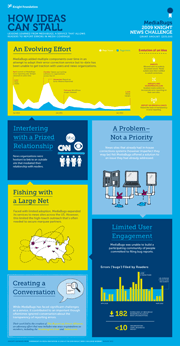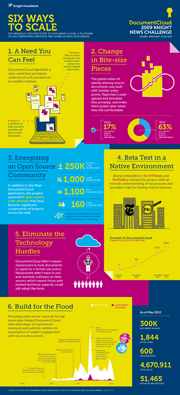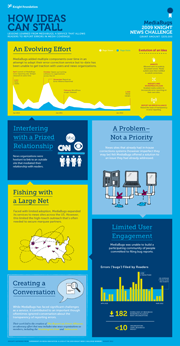
Ingredients for successful Knight News Challenge projects
If the number one question for Knight Foundation is “how do I win the News Challenge,” a close second is “how can I make my media innovation project successful.” Related
“Six Ways to Scale” Graphic (PDF)
“How Ideas Can Stall” Graphic (PDF)
Earlier evaluation report in this series: “Interim Review of the Knight News Challenge“
To help answer that question, and to provide insights on how Knight can strengthen its grant making, the foundation has been conducting, in partnership with Arabella Advisors, an ongoing review of the Knight News Challenge with an eye towards what makes media innovation projects work. Today we’re releasing a review of the 2009 News Challenge winners, which include nine projects that, among other things, provided new ways to visualize data, platforms for crowdsourcing and mapping, and tools for exploring and sharing primary source documents on the web.
Predictably, not all of these funded innovations have succeeded in gaining traction. After all, the News Challenge is intentionally designed to encourage experimentation with new ideas for gathering, sharing and using news and information. In many cases, individual projects are still evolving as they continue to influence their targeted field and communities.
Below, though are four insights about what made some projects successful, many of which confirm well-known principles of innovation as well as effective project management. They’re also included in a slideshare summarizing the report.
• The wisdom that nurtures innovation – some of the News Challenge start ups benefited from having an institutional home to incubate and grow their ideas. These successful projects drew on the experience, leadership and networks of their existing host organizations to drive their innovations forward. One case in point is Data Visualization, which benefited from being a part of a larger institution, the Jefferson Institute, a Washington, DC-based nonprofit group focused on research in education. As the project grew, it was able to draw on the Jefferson Institute’s network for outreach support alongside the ability to broker partnerships with the Christian Science Monitor, PBS NewsHour, The Miami Herald and The Wall Street Journal. Currently, 548 sites report using the Data Visualization tools.
• A need you can feel – There are a lot of great ideas out there. But the ones that turn into successful projects often build their efforts to address a real problem for a well-defined audience. This focus provided a number of News Challenge winners with clarity in their goals and an ability to continually refine their products with their community’s needs in mind. Not all projects were focused on issues that were well understood as pressing problems by their target audience. MediaBugs, which allows users to publicly document errors they find in the news and submit those reports for correction, struggled to convince news organizations to adopt new practices as most news outlets felt it offered a solution to an issue they had already addressed (albeit highly imperfectly). See MediaBugs infographic.
• Code release practices – Projects that gained the most traction among software developer communities were intentional about creating and releasing their open source code in stages that allowed others to follow and contribute to their project. The DocumentCloud team, for example, made a conscious decision to release their code regularly, and provided detailed documentation and comments that made it easy for others to use and modify. In an open source world, where adoption matters, managing access and sharing are as important as managing creation. To date, DocumentCloud has publicly released several standalone components, which include the 8th and 30th most watched code repositories and the 14th most forked (i.e. copied and modified) repository of the more than 3 million publicly available on Github. See DocumentCloud infographic.
* Cultivating evangelists – Many News Challenge winners face a common obstacle: gaining adoption of their product or service in a news industry that is often resistant to both change and to unfamiliar technologies, or that doesn’t have the resources to evaluate every new tool available. Some media innovations benefited from having advocates who championed their products from within news organizations, helping to ease the transition toward new methods and approaches. DocumentCloud benefited from having web-savvy, technically proficient journalists in influential newsrooms that promoted their platform as a way to better manage primary source documents. Having internal advocates that can bridge the cultural gap between innovations and their target community and provide quick and easy technical support for potential adopters is a great asset for any project.
Supporting ideas beyond funding
As part of this interim review of the News Challenge, 2009 grantees also suggested areas where Knight Foundation itself could learn from some of the winners’ successes and travails to improve its support of media innovation. Among the insights – grantees were mostly satisfied with the News Challenge brief application and the grant agreement processes, but believed the foundation could do more to connect them with additional partners, resources and other News Challenge winners. In particular, grantees expressed a desire for more regular communication with the foundation to help stay up-to-date on project progress and troubleshoot as needed, and for greater non-financial support, especially marketing, networking and communications resources to help advance their projects. We’ve been taking this advice into account, and have connected more recent winners with branding consultants and marketing help, as well as gathering them as groups to exchange ideas.
Feedback from early News Challenge winners also inspired Knight Foundation to offer the shorter, more focused challenge rounds that were put together this year to better mirror the pace of innovation. Similarly, the challenge was shifted to themed contests on specific issues, such as networks, data and mobile.
Knight is currently accepting applications for the News Challenge on mobile through noon EST Monday, Sept 10. We hope these insights can help inform individual submissions and strengthen media innovation ideas in the future.
By Knight Foundation’s Michael Maness, vice president/Journalism and Media Innovation, Mayur Patel, vice president/Strategy and Assessment, and Lucy Bernholz, managing director at Arabella Advisors
Recent Content
-
Journalismarticle ·
-
Journalismarticle ·
-
Journalismarticle ·




